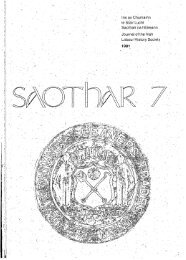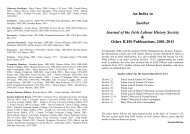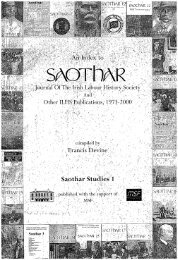70 SAOTHAR13'respectable' and sober lifestyle. The moral agent was the mainspring of the whole system, supervisingpersonal behaviour, and 'continually urging and exhorting the tenantry' .16 The behaviour of all familymembers was expected to comply with the landlord's religious convictions. Any tenant charged withillegal' distillation was assured of im!llediate eviction, the singing of bawdy ballads was discouraged,and psalmody was taught in the schools in a direct attempt to replace them. Parents were advised tokeep their children from such vices as swearing, gambling and dancing, and all children were expectedto attend the estate schools. Since these were run along strictly evangelical lines, Roman Catholictenants were at somewhat of a disadvantage, and accusations of proselytism led to a heated controversyon the Farnham estatePIn this exercise of paternalistic benevolence can be seen the interaction of social, political, religiousand economic motives. The whole system seemed designed to erode traditional rural folk culture andreplace it with an alternative set of values. It indicates too how evangelical Protestantism and social andeconomic progress were inextricably linked in the minds of its promoters in the same way as IrishCatholic culture was associated with backwardness and inefficiency. The system professed to heightenthe individual responsibility of the tenants by cutting out middlemen and coercion. But the emphasis- indeed insistence - on high standards of personal and social morality meant that their lives were tightlymonitored and controlled, and choices strictly limited. ls The personalising of estate management, andthe obvious temporal advantages to be gained by conforming to the landlord's expectations, were adeliberate attempt to reinforce the bond between landlord and Protestant tenant, introducing a newelement of control at a time when other social, economic and political developments were weakeningthe traditional bonds. There' were also economic advantages. An overhaul of methods of estatemanagement was one aspect of the process of modernisation already under way on Irish farms in thelate 1820s.19 A consolidation of holdings, the closer relationships between landlord and tenant, and theimplementation of a more streamlined and efficient system of management was entirely reconcilablewith the new 'moral' order. This reform of estate administration was in may cases carried out withregard to purely materialistic considerations. But, as in other areas of Ulster life, evangelicalismsupplied a religious sanction for more prosaic concerns. Allegations of hypocrisy against evangelicallandlords WOUld, however be largely misplaced. The harmony of religious and secular motivationwhich they achieved, albeit conveniently, is not amenable to such simple or crude explanations.Whatever their critics might say these men professed to love their God more than their estates.The educational objectives of evangelical landlords were capable of much wider application,especially through Sunday schools which were the most successful of all the devices through whichevangelical leaders sought to promote respectable and morally-uplifting habits among the uneducated.Since the establishment of the Reverend Kennedy' s Sunday school in county Down during the 1770s,Anglicans, Methodists and all shades of Presbyterians had taken up the cause, supported by the highestecclesiastical, social and even commercial interests. 2o The Hibernian Sunday School Society foundedin 1809 as a co-ordinating body, listed 256 Sunday schools in connection with it in 1816;by 1846 thenumber was 1,975,21 Some idea of the influence of these schools can be gleaned from the fact that in1831 the proportion of Sunday school scholars to population in the province was 1: 14, in county Antrimit was 1:9.22 All Protestant evangelicals agreed that Sunday schools were 'a means of eventuallyrestoring political tranquillity to this long-distracted country'.23 They strove to promote class harmony,stressing the 'mutual kindness and affection between rich and poor', exemplified in the bond ofsympathy promoted between the instructed and their (unpaid) teachers.24 The emphasis of the societywas on instilling the social niceties - good manners, morals and appearance, and the Committee ofEducation in 1826 concluded that itwas 'oneofthe most powerful instruments for raising the character,and for advancing the general welfare of the people' .25However, while Sunday school managers had their own motives and expectations, they would nothave achieved their outstanding de'gree of success if they had not been providing the lower orders wiili- .something they needed and wanted in practical as well as spiritual terms. The utilitarian attributes ofthe Sunday school movement were particularly relevant to a society suffering the stresses of transition
.. ...... ~.~ -~ .'- '.ESSAYS. 71from rural. to urban life. They offered educational and recreational facilities, and a social substitute forthe old rural relationships. The educational provision was particularly important in the days before theestablishment of a national system, especially in the north east. 26 With the mills and factories of the linenand cotton industries keeping many young people and even children in employment during week days,Sunday was often the only day in which any kind of educational purs,uit was possible. The Sundayschools, particularly in the early days, reached out to the very poorest elements in society. For listeningto the scripture passages and the 'theology of poverty' preached by the teachers, the scholars receivedin return, warmth, shelter, education, sometimes material aid in the form of shoes or clothes,intermittent outings and entertainments, and - not least - a faith which helped them to cope with thevicissitudes of life.27 The fact that many·schools. werd,nitiated by those working and living in thecommunity, further suggests that they were less 'a fomi of social manipulation than is commonlysUpposed.28 This matches the conclusions of English social historians who suggest that Sunday schoolsflourished because 'working class parents wanted the education they provided, and generally endorsedthe values that they taught' .29 The benefits of literacy, cheapness and entertainment outweighed theobvious disadvantages of religious paternalism. W.R. Ward is therefore right to conclude that they werethe only religious institutions in the nineteenth century which the great mass of Protestant workingpeople had any intention of using. 30In the evangelical crusade for moral reformation, temperance was a recurring theme. Drunkennesswas regarded as the prime cause of sexual immorality, gambling, broken homes, poverty and socialstrife, and was so prevalent thaUt was regarded as 'the national curse of Ireland' .31 As with so manyUlster movements, the impetus for temperance societies originated in America, was taken up by localclergy of various denominations, and with the support of influential laymen spread rapidly throughoutthe province. 32 By 1833, only four years after the first plans were published, there were 15,000 membersof temperance societies in Ulster.33 The emphasis of these societies was on moderation rather than totalabstention. 34 The teetotal movement which began in 1834 was regarded as extremist, and middle classfears of its radicalism appeared justified when Father Mathew's popular Roman Catholic crusadeagainst 'all intoxicating liquors' became linked in the public mind with O'Connell's Repeal movement.35While the records of churches and missions suggest a unified stance on the part of the religiousversus the irreligious on the question of alcoholic consumption, there were several distinguishableapproaches. The middle classes, while publicly supporting the values of sobriety, were not always keento align themselves with the cause of temperance. The Rev. Dr. John Edgar, an orator of some abilityand instigator of the movement in Ulster, found himself abused and ridiculed at his first campaignmeetings.36 The editor of the liberal Belfast Guardian refused to print a public letter announcing theformation of the new society, and the members of Edgar's church declined the use of their meetinghouse. 37 This indicated how the consumption of alcohol was considered acceptable by 'respectable'citizens. It should also be remembered that Ireland was the first European country to attempt such aventure, and that the element of novelty was itself a disincentive for conservative citizens.Nor did all those who supported the temperance movement do so from pure! y religious motives. Thebasic underlying impulse, the idea of 'improvement', was central to evangelical ideology, but therewere others who saw in the benefits arising from a more sober, industrious and thinking peasantry, thebasis of political as well as personal advancement and independence. Not only landlords andevangelicals, but employers, radicals, and reformers in general supported the 'improving' movement,each viewing the advantages of a sober working class in a different light. The interests of employersin promoting the sobriety of their workforce is self-evident, and in Belfast mill-owners, manufacturersand merchants promoted the cause. 38 Catholic nationalists were also convinced that the self-respect andself-esteem arising from sobriety could advance not only moral, but political aspirations. 39 Self-denialwas thus seen as the foundation of more than mere religious reform. The course of the temperance·campaign shows how popular movements, particularly those with a religious basis, were drawn intowider Irish political concerns, with spokesmen of every colour and creed intent on utilising their
- Page 1 and 2:
JOURNAL OF THE IRISH LABOUR HISTORY
- Page 3 and 4:
ContentsPageEditorial: Labour Histo
- Page 5 and 6:
EDITORIAL 3freedom to participate i
- Page 7 and 8:
CorrespondenceThe Irish Labour Part
- Page 9 and 10:
; ~ ; ,The Decline and Fall of Donn
- Page 11 and 12:
THE DECLINE AND FALL OF DONNYBROOK
- Page 13 and 14:
THE DECLINE AND FALL OF DONNYBROOK
- Page 15 and 16:
·' THE DECLINE AND FALL OF DONNYBR
- Page 17 and 18:
THE DECLINE AND FALL OF DONNYBROOK
- Page 19 and 20:
THE DECLINE AND FALL OF DONNYBROOK
- Page 21 and 22: THE DECLINE AND FALL OF DONNYBROOK
- Page 23 and 24: THE DECLINE AND FALL OF DONNYBROOK
- Page 25 and 26: ,'-,;-''''.A PASSAGE TO BRITAIN 23C
- Page 27 and 28: A PASSAGE TO BRITAIN 25only in the
- Page 29 and 30: A PASSAGE TO BRITAIN 27clothing._De
- Page 31 and 32: A PASSAGE TO BRITAIN 29established
- Page 33 and 34: ;:-.",.- .. .", ...... '.:. '
- Page 35 and 36: LOUIE BENNETI 33feminist movement w
- Page 37 and 38: :... ~: ."
- Page 39 and 40: -.- '.LOUlE BENNETT 37While there i
- Page 41 and 42: LOUIE ~ENNEIT 39Xl's encyclical Qua
- Page 43 and 44: LOUIE BENNEIT 41Bennett's own relat
- Page 45 and 46: LODIE BENNETT 43109; IWWU resolutio
- Page 47 and 48: Essays in ReviewCosherers, Wanderer
- Page 49 and 50: ••• .".'. >. '~"ESSA YS IN RE
- Page 51 and 52: ESSAYS IN REVIEW 49ConnolIy:Myth an
- Page 53 and 54: ESSAYS IN ~EVIEW 51tion' in the Int
- Page 55 and 56: ESSAYS IN REVIEW53International:'I
- Page 57 and 58: REVIEWScontroversy is real history.
- Page 59 and 60: REVIEWSJoe Monks was among the earl
- Page 61 and 62: REVIEWSnolly-Column Song','Proudly
- Page 63 and 64: REVIEWSresulting from the arrival o
- Page 65 and 66: REVIEWS,63the book by means of an a
- Page 67 and 68: REVIEWSlogue, it is hardly surprisi
- Page 69 and 70: The Team For All Workers ...CULIAIB
- Page 71: ESSAYS 69mission and moral refonn.l
- Page 75 and 76: ESSAYS 73claimed authority but whic
- Page 77 and 78: ESSAYS 75provided the basis for soc
- Page 79 and 80: ESSAYS 779. For comparisons see E.T
- Page 81 and 82: ESSAYS 7952. Annals of Christ Churc
- Page 83 and 84: ESSAYS' 81Fianna Fail and the Worki
- Page 85 and 86: ESSAYS 83Eireann in 1925 visibly di
- Page 87 and 88: ESSAYS 85recognition of the impract
- Page 89 and 90: ESSAYS 871970, it created the condi
- Page 91 and 92: ESSAYS89The Irish Immigrants' Contr
- Page 93 and 94: ESSAYS" 91Although anti -Catholic p
- Page 95 and 96: ESSAYS 93McCowie played a key role
- Page 97 and 98: :. -,,'.' ',. .~.,:.ESSAYS 95Althou
- Page 99 and 100: ESSAYS 97young girl of their own ba
- Page 101 and 102: SourcesIrish Labour History Society
- Page 103 and 104: SOURCES 101INovember, 1971 to no. 1
- Page 105 and 106: SOURCES 103would claim credit for t
- Page 107 and 108: SOURCES105Sources for Irish Labour
- Page 109 and 110: SOURCES 107NorthWest Archives and L
- Page 111 and 112: SOURCES 109In 1966 the Finnish gove
- Page 113 and 114: TURNINGANEWLEAFThe CPSSUis the larg
- Page 115 and 116: REMINISCENCE 113us due to my politi
- Page 117 and 118: REMINISCENCE 115when Jim was presen
- Page 119 and 120: REMINISCENCE 117of Dail Eireann. 17
- Page 121 and 122: REMINISCENCE 119NotesThe above arti
- Page 123 and 124:
DOCUMENT STUDY 121James Connolly in
- Page 125 and 126:
DOCUMENT STUDY123SOCIAL DEMOCRATIC
- Page 127 and 128:
DOCUMENT STUDY 125proletariat of th
- Page 129 and 130:
DOCUMENT STUDY 127the support of Je
- Page 131 and 132:
DOCUMENT STUDY 12926. The Workers'
- Page 133 and 134:
131BibliographyA Bibliography of Ir
- Page 135 and 136:
BIBLIOGRAPHY 133Compton, P.A. Demog
- Page 137 and 138:
BIBLIOGRAPHY 135Levine, I. and Madd
- Page 139 and 140:
BIBLIOGRAPHY 137Turner, M. 'Towards
- Page 141 and 142:
BIBLIOGRAPHY 1394. Land and Agricul
- Page 143 and 144:
BIBLIOGRAPHY 141Clogher Record12 (2
- Page 145 and 146:
BIBLIOGRAPHY 143Political Research
- Page 147 and 148:
BIBLIOGRAPHY 145Pres, 1987.O'Brien,
- Page 149 and 150:
147Notes on Contributorsf onathanBe
- Page 151 and 152:
1901: Ireland's first general union
- Page 153 and 154:
ELECTRICAL TRADES UNION .Establishe





